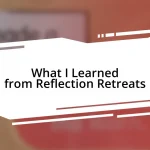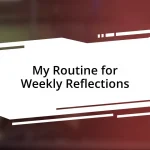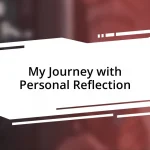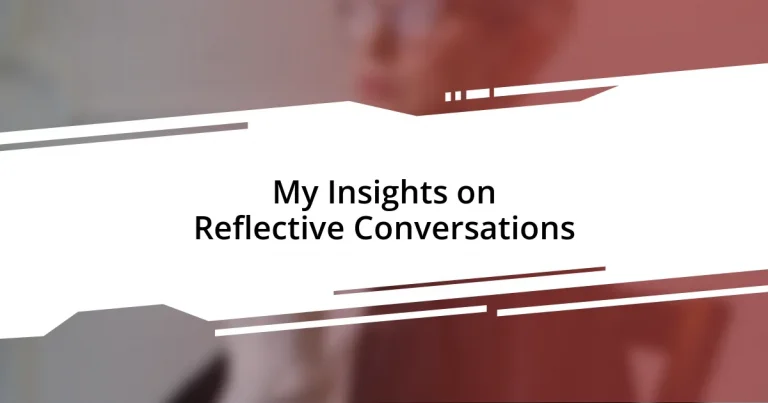Key takeaways:
- Reflective conversations promote deep understanding and personal growth through active listening and vulnerability.
- Key techniques for fostering reflection include journaling, asking open-ended questions, and maintaining a comfortable environment.
- Overcoming challenges, such as fear of vulnerability and distractions, enhances the depth of reflective discussions.
- Continuous improvement through reflective practice leads to significant personal and professional growth, often yielding insights over time.
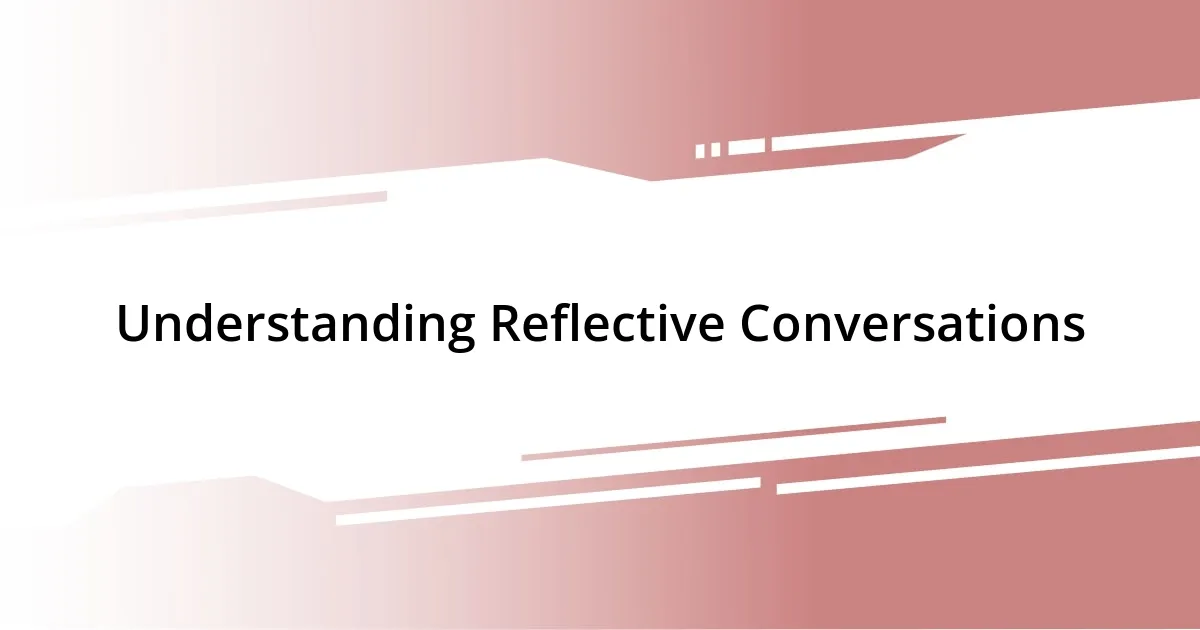
Understanding Reflective Conversations
Reflective conversations are more than just an exchange of words; they are a deep dive into thoughts and feelings. The beauty of these conversations lies in their ability to foster understanding and connection. Have you ever found yourself in a discussion where, at first, it seemed like small talk, but then it led to profound insights? I can recall having a casual chat with a friend, which unexpectedly unraveled layers of our experiences, leading to a richer understanding of each other.
Engaging in reflective conversations requires active listening and genuine curiosity. I remember a time when a mentor asked me open-ended questions that guided me to think critically about my experiences. It felt like peeling back the layers of an onion, revealing emotions and understandings I hadn’t fully recognized before. This process not only helped me learn about myself but also deepened my relationship with my mentor, creating a safe space for vulnerability.
The essence of reflective conversations is in the exploration of feelings and thoughts. Why do we hesitate to share our true emotions during discussions? I believe it often stems from fear of judgment. I’ve learned that by embracing vulnerability, I can connect with others on a much deeper level, transforming ordinary dialogues into powerful reflections that shape our perspectives and foster growth.
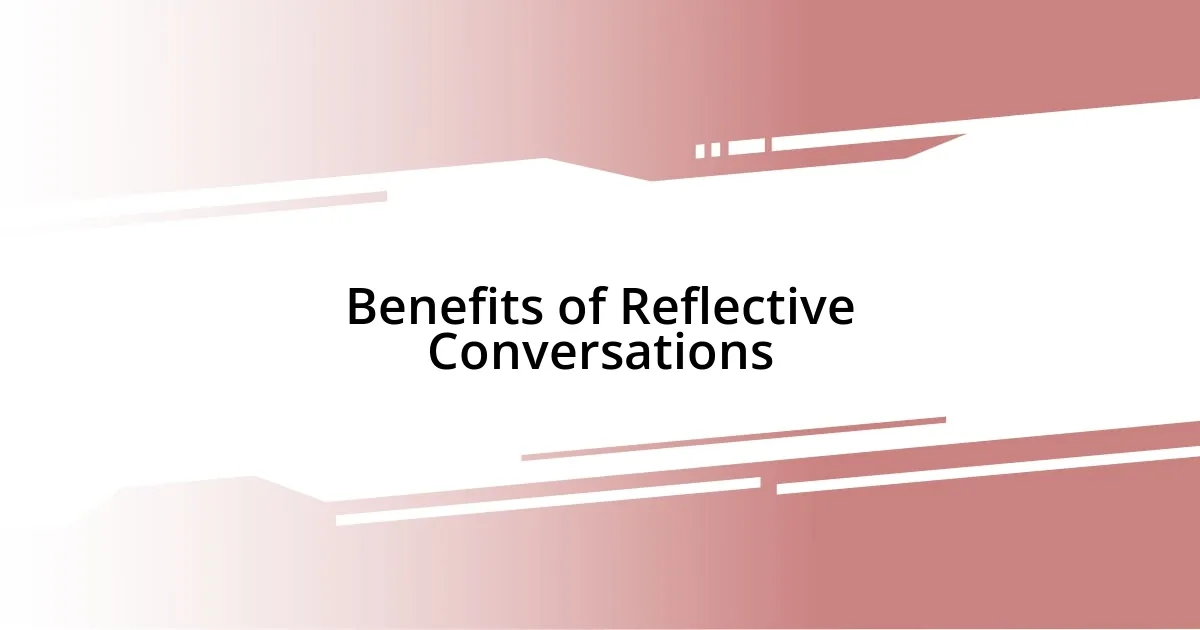
Benefits of Reflective Conversations
Reflective conversations open the door to self-discovery and personal growth. I’ve experienced a profound shift when simply sharing my day turned into exploring how specific events shaped my feelings. In one of these discussions, a simple question from a friend prompted me to confront some lingering fears, leading to realizations that empowered me to take actionable steps in my life. It was a true “aha” moment, highlighting how these exchanges can serve as catalysts for change.
On a professional level, reflective conversations can lead to enhanced collaboration and teamwork. I once participated in a team debrief after a project, where we discussed not only the successes but also the challenges we faced. This practice not only improved our problem-solving skills but also cultivated trust among us. By sharing insights about what worked and what didn’t, we built a culture where everyone felt valued and heard. It was rewarding to witness how reflective conversations transformed our approach to future projects.
Furthermore, the emotional benefits of reflective conversations cannot be overstated. There’s something incredibly freeing about verbalizing thoughts that swirl in the mind. I recall an evening spent with a close friend, where we shared our dreams and fears. That conversation not only deepened our friendship but also provided a sense of release as I confronted my insecurities. It reminded me that sometimes just having a safe space to express myself can be the first step towards healing and clarity.
| Benefit | Description |
|---|---|
| Self-Discovery | Encourages personal insights and confronts fears. |
| Team Collaboration | Enhances teamwork by recognizing strengths and challenges. |
| Emotional Healing | Offers a safe space for expressing feelings and promotes clarity. |
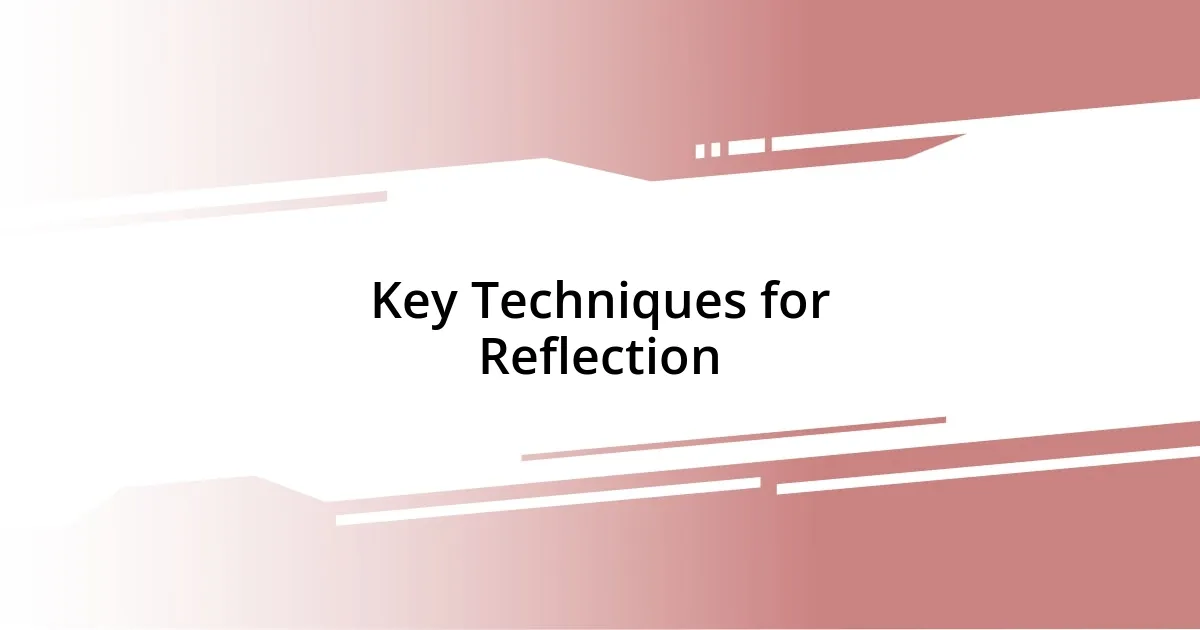
Key Techniques for Reflection
Reflective conversations thrive on specific techniques that foster deeper understanding. One technique I find valuable is the practice of journaling before engaging in a reflective discussion. Writing down my thoughts and feelings allows me to clarify what’s important to me. I remember a time when I felt confused about a relationship. I simply wrote down my thoughts, which cleared the fog, enabling me to articulate my feelings more effectively during a conversation with my friend. This preparation transformed our dialogue into a meaningful exploration rather than just surface-level chatter.
To further enrich reflective conversations, it’s important to invite feedback and ask open-ended questions. This dynamic encourages the other person to share their insights, too. I experienced this once during a mentoring session, where instead of asking, “Did you enjoy that project?” I asked, “What was the most challenging part for you?” That simple shift opened an incredible dialogue that illuminated perspectives I hadn’t considered. Here are some key techniques for fostering reflection:
- Journaling: Writing thoughts and feelings beforehand to clarify your ideas.
- Open-ended Questions: Posing questions that invite deeper responses and insights.
- Active Listening: Concentrating fully on the speaker to understand their perspective.
- Empathy: Practicing understanding and sharing feelings to create a connection.
- Feedback: Encouraging the exchange of thoughts to enhance understanding.
These techniques have made my conversations more rewarding and insightful, leading to transformative insights that I cherish.
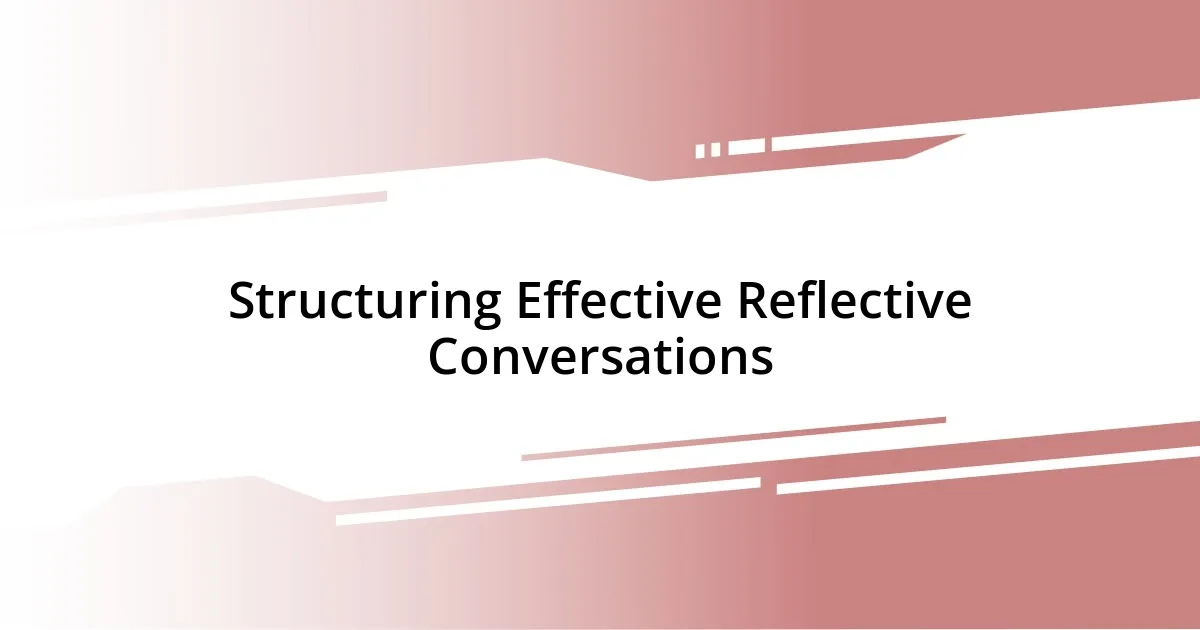
Structuring Effective Reflective Conversations
Structuring effective reflective conversations starts with creating a comfortable environment. I remember a time when I met a colleague at a quiet café instead of the usual office setting. The change of scenery instantly made our chat feel more relaxed and open, allowing us to share thoughts more freely. Have you ever noticed how the right atmosphere can change the quality of a conversation?
Once the mood is set, the key is to ask thought-provoking questions that prompt deeper reflection. After a challenging project at work, I approached my team not with “What went wrong?” but with “What did we learn about ourselves during this process?”. This shift encouraged everyone to share valuable experiences. I saw colleagues reflect not only on the project but also on personal growth moments they’d encountered. This kind of inquiry can lead to transformative insights – it’s amazing how a simple rephrasing can unlock layers of understanding.
Lastly, I believe active listening is essential. I’ve had moments where I realized I was more focused on what I wanted to say next than truly hearing my conversation partner. This often led to missed connections. When I consciously practiced active listening, it changed everything. By fully engaging, I could respond more meaningfully and create an atmosphere of trust. This reciprocal exchange enriches the conversation and fosters a deeper sense of connection. It’s a beautiful reminder that reflection is as much about listening as it is about sharing.
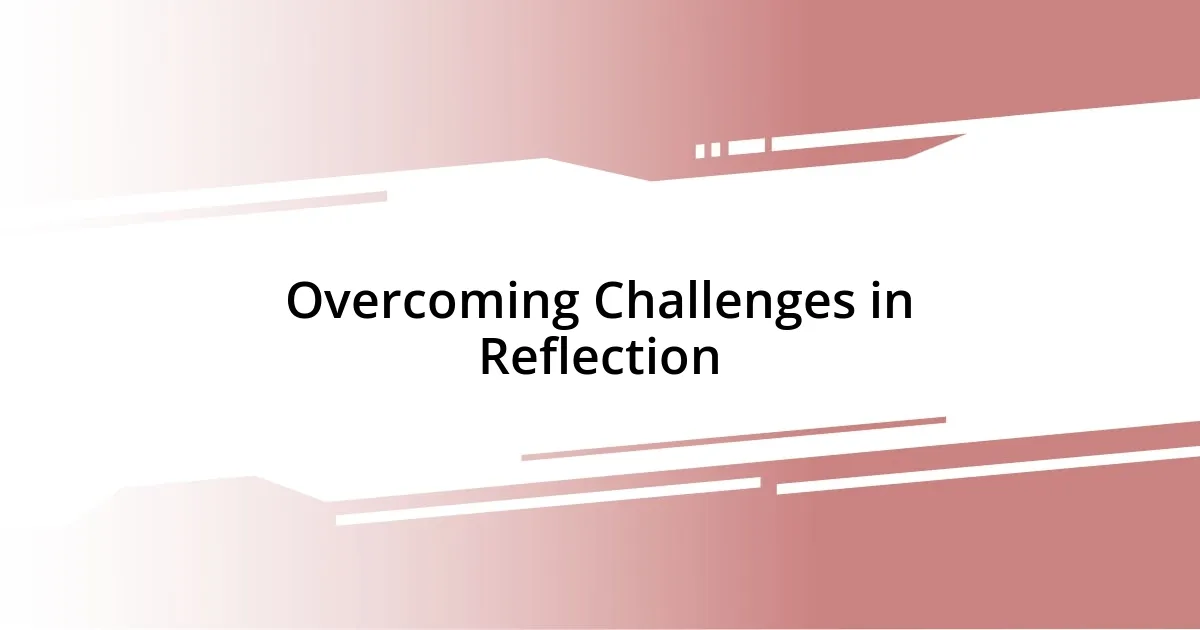
Overcoming Challenges in Reflection
Sometimes, I find that the biggest challenge in reflection comes from a fear of vulnerability. Opening up about our thoughts and feelings can feel intimidating, but I’ve learned that embracing this vulnerability often leads to richer insights. For instance, there was a time I hesitated to share my insecurities with a close friend during a reflective conversation. However, once I did, I discovered we both faced similar fears, which strengthened our bond and deepened our discussion.
Another hurdle I’ve encountered is the tendency to get sidetracked by distractions. It’s easy to let external noises or internal thoughts derail a meaningful reflection. I recall once sitting down for a reflective chat when my phone buzzed continuously. What started as a sincere inquiry quickly morphed into me checking my messages. Recognizing this, I decided to put my phone away and focus only on the conversation. This small act of discipline transformed the encounter, allowing us to delve into topics we might have otherwise glossed over.
Moreover, I’ve noticed that sometimes, I feel overwhelmed by the emotion that arises during reflective conversations. This experience can be both rewarding and daunting. I remember getting choked up while discussing a personal loss, feeling as if the emotional weight might derail the reflection. But I realized that allowing myself to feel those emotions opened up the conversation in unexpected ways. It reminded me that reflection is not just about understanding experiences but also about processing the feelings tied to them. How have your emotions shaped your reflective conversations? Sometimes, embracing those feelings can lead to the most profound insights.
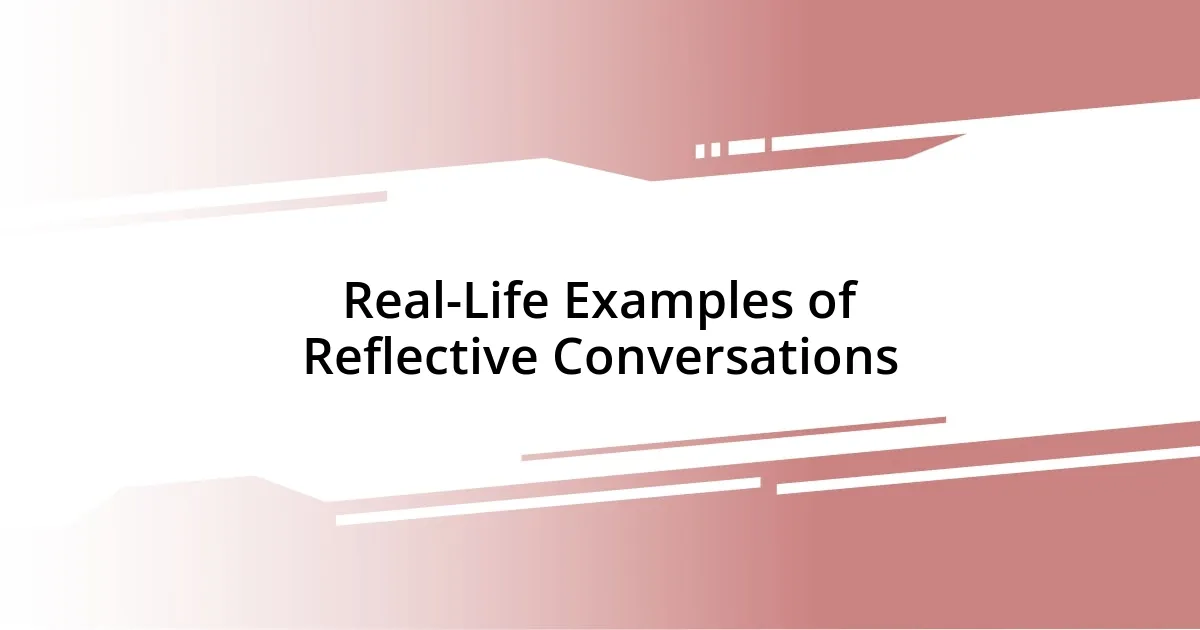
Real-Life Examples of Reflective Conversations
Reflective conversations can unfold in the most unexpected places. I remember a road trip with a friend where we found ourselves stuck in traffic for hours. With nothing else to do, we began discussing life choices and aspirations. What started as a casual chat quickly turned into a deep reflection about our past decisions and future dreams. It was eye-opening to hear my friend’s honest thoughts, and it made me question my own path in a way I hadn’t done before.
Another memorable experience happened during a mentoring session. I was guiding a junior colleague who had been struggling with confidence in their role. Instead of just offering advice, I asked, “What do you believe holds you back?” This simple question led to an exploration of their fears and insecurities, revealing an amazing layer of self-awareness I hadn’t anticipated. By the end of that session, I realized how much I had also gained from our exchange—to me, it illustrated how reflective conversations are as powerful for the listener as they are for the speaker.
I’ve also faced moments where I felt the weight of shared stories linger in the air. Once, during a gathering with a group of friends, a discussion about our childhoods turned emotional. As I opened up about a difficult time in my life, I saw a shift in the group’s dynamic; everyone began sharing their own struggles. It was a powerful moment that illustrated how vulnerability can foster connection. Don’t you find it fascinating how sharing our truths can unite us in ways we never expect? Reflecting together not only enhances understanding but also strengthens our bonds in profound ways.
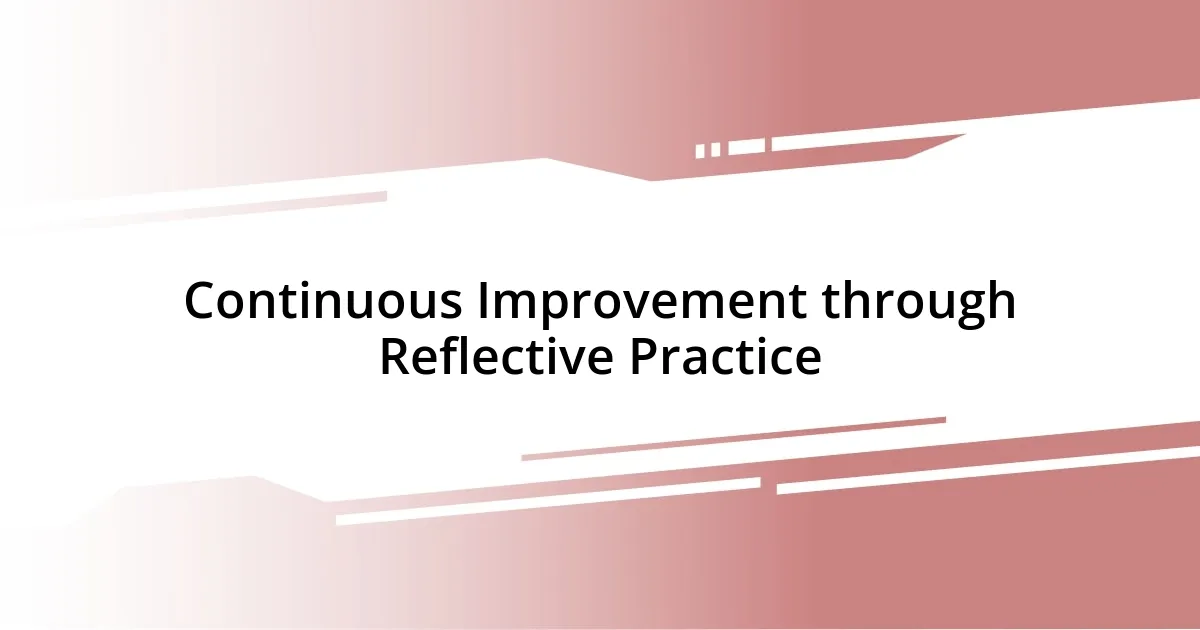
Continuous Improvement through Reflective Practice
Continuous improvement through reflective practice is an ongoing journey that I find deeply rewarding. The act of regularly assessing my experiences transforms my learning process. For example, I remember a time when I implemented feedback from a colleague after a presentation. Rather than brushing off their suggestions, I committed to reflecting on their points, which ultimately helped me enhance my delivery in future talks. Isn’t it amazing how a moment of introspection can lead to significant growth?
I’ve also encountered the realization that not all reflections yield immediate or clear insights. Initially, I would feel disheartened if I didn’t walk away with a “lightbulb moment.” However, I learned that sometimes, the real value lies in simply sitting with my thoughts. For instance, after a challenging project, I took time to ponder what aspects went well versus what did not. In those quiet moments of contemplation, I often find that clarity strikes later on, sometimes when I least expect it—like during a casual walk or even in the shower. Have you ever noticed how ideas often bubble up at the most unexpected times?
In my experience, sharing these reflections with others not only boosts personal improvement but often sparks mutual growth. The last time I gathered with a few colleagues to evaluate a project we worked on, we found ourselves discussing our different approaches and learning from each other’s experiences. This dialogue opened up new avenues of thought and collaboration that I hadn’t considered before. Isn’t it intriguing how reflecting collectively amplifies the learning experience, making it richer for everyone involved?



